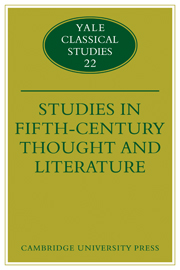Book contents
- Frontmatter
- Contents
- Tribute to Harry Mortimer Hubbell
- Preface
- The Socratic self as it is parodied in Aristophanes' Clouds
- The relativism of Protagoras
- Thucydides' historical perspective
- The psychoanalysis of Pentheus in the Bacchae of Euripides
- Aetiology, ritual, charter: three equivocal terms in the study of myths
- Divine and human action in Sophocles: the two burials of the Antigone
- Menander's Samia in the light of the new evidence
- The choral odes of the Bacchae of Euripides
- Stylistic characterization in Thucydides: Nicias and Alcibiades
- Scientific apparatus onstage in 423 B.C.
- Phaedra and the Socratic paradox
- Euripides' Iphigenia in Aulide 1–163 (in that order)
- Notes on Sophocles' Trachiniae
Scientific apparatus onstage in 423 B.C.
Published online by Cambridge University Press: 10 January 2011
- Frontmatter
- Contents
- Tribute to Harry Mortimer Hubbell
- Preface
- The Socratic self as it is parodied in Aristophanes' Clouds
- The relativism of Protagoras
- Thucydides' historical perspective
- The psychoanalysis of Pentheus in the Bacchae of Euripides
- Aetiology, ritual, charter: three equivocal terms in the study of myths
- Divine and human action in Sophocles: the two burials of the Antigone
- Menander's Samia in the light of the new evidence
- The choral odes of the Bacchae of Euripides
- Stylistic characterization in Thucydides: Nicias and Alcibiades
- Scientific apparatus onstage in 423 B.C.
- Phaedra and the Socratic paradox
- Euripides' Iphigenia in Aulide 1–163 (in that order)
- Notes on Sophocles' Trachiniae
Summary
This paper offers supporting evidence for the true, but unstylish, thesis that Western science entered Athens in the mid-fifth century b.c. like a tinker's cart, hung about with jangling and gleaming hardware. That thesis, in turn, is a vital link in an inductive proof that Western science has never actually developed apart from close interaction with measures, models, and machines.
The traditional view, common to histories of science and philosophy and to more general interpretations of classical culture, made the use of models, observation, and apparatus the crucial difference between ‘science’ in its classical and in its modern form. This did not quite match the actual documents and achievements of classical work from Archimedes through Ptolemy, and more detailed study led to a new and different consensus. Since 1951, the empirical character of post-Aristotelian science has been recognized, and explained as the result of a confluence of Near Eastern computational, observational technique and a more austere classical qualitative, speculative fondness for theory construction. The date of fusion is put at about 323 b.c., the death of Alexander the Great. On this recent view, apart from an incidental early coincidence, science in Greece before 323 would still have been the austere, anti-empirical enterprise which earlier historians thought typical of classical science in general.
- Type
- Chapter
- Information
- Studies in Fifth Century Thought and Literature , pp. 215 - 222Publisher: Cambridge University PressPrint publication year: 1972



